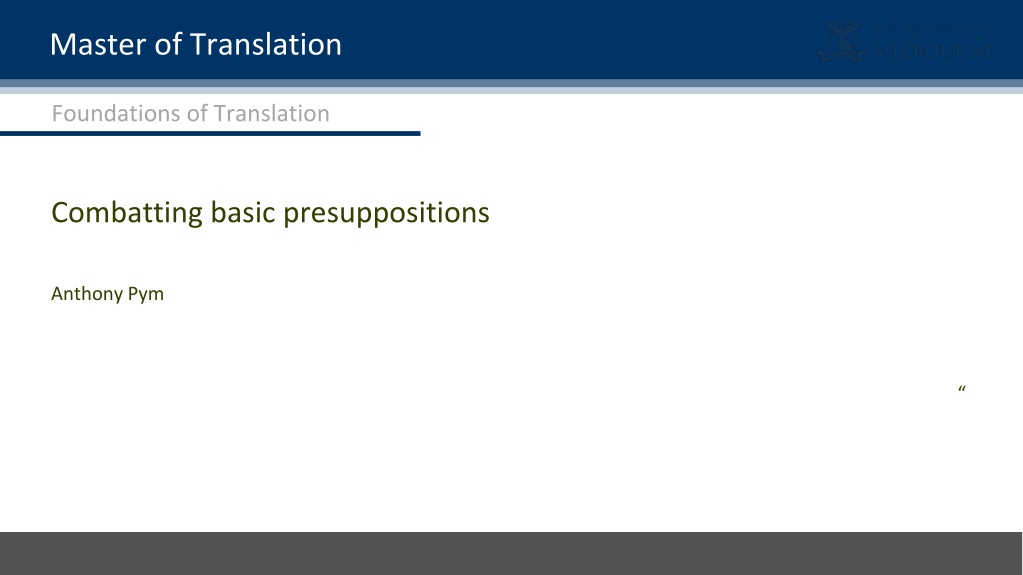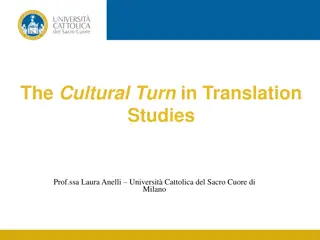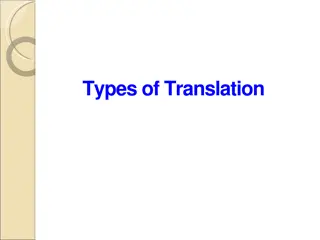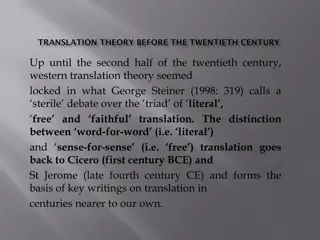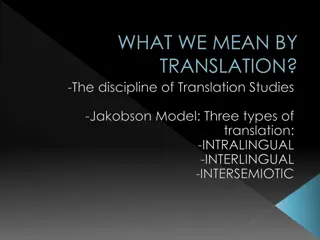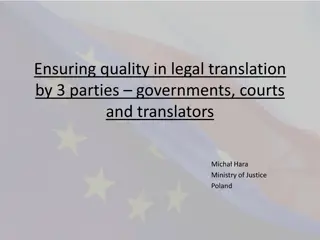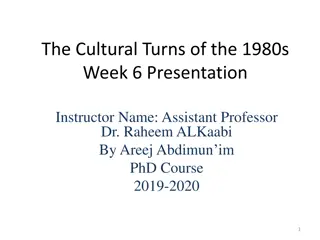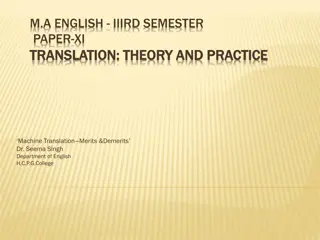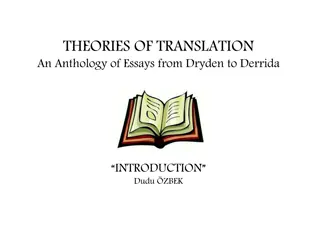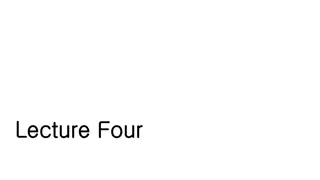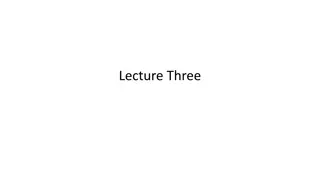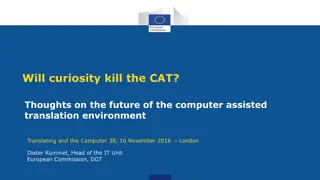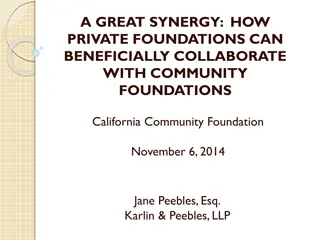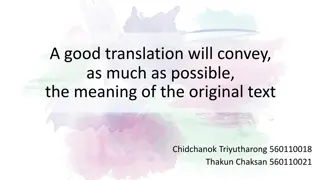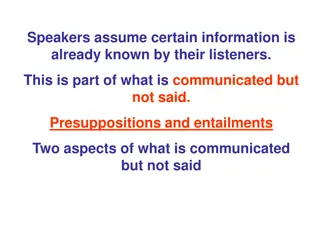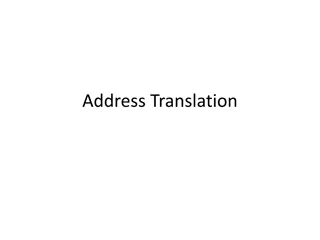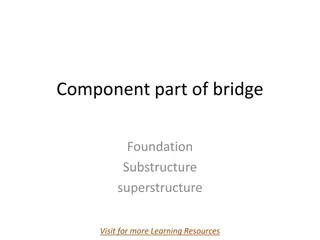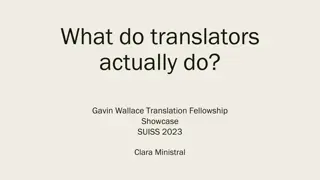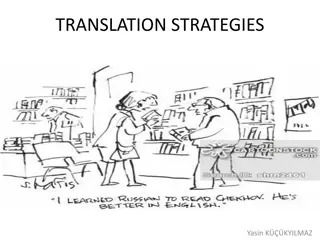Exploring Foundations of Translation: Combatting Presuppositions
Delve into the world of translation with a focus on combatting basic presuppositions. Explore different aims in translation, understand prescriptivism versus descriptivism, and discover key concepts in Translation Studies from the 1960s to today. Learn about the Skopostheorie, empirical disciplines, and the neutrality of descriptivism in translation practices.
Download Presentation

Please find below an Image/Link to download the presentation.
The content on the website is provided AS IS for your information and personal use only. It may not be sold, licensed, or shared on other websites without obtaining consent from the author. Download presentation by click this link. If you encounter any issues during the download, it is possible that the publisher has removed the file from their server.
E N D
Presentation Transcript
Master of Translation Foundations of Translation Combatting basic presuppositions Anthony Pym
Master of Translation Presupposition 1: The aim is to tell someone how to translate One might aim to: - Discover new ways of translating - See the effects of different ways of translating - Understand why people translate differently.
Master of Translation Prescriptivism according to Savory (1968: 49) 1. 2. 3. 4. 5. 6. 7. 8. 9. 10. 11. 12. A translation must give the words of the original. A translation must give the ideas of the original. A translation should read like an original work. A translation should read like a translation. A translation should reflect the style of the original. A translation should reflect the style of the translator. A translation should read as a contemporary of the original. A translation should read as a contemporary of the translator. A translator may never add to or omit from the original. A translator may add to or omit from the original. A translation of verse should be in verse. A translation of verse should be in prose.
Master of Translation Descriptivism From the 1960s and 1970s: Lev , Popovi , Even-Zohar, Toury, Lefevere Gideon Toury, Descriptive Translation Studies and beyond (1995)
Master of Translation Descriptivism Skopostheorie: Equivalence means same function , and it is a rare case. Toury: All translations produce equivalence by definition (and equivalence is the necessary case).
Master of Translation Descriptivism Translation Studies as an empirical discipline (Holmes) Need to focus on the target side (Toury) Need to be rigorously descriptive and objective, not prescriptive (Toury) Need to consider the social contexts, such as patronage (Lefevere) Translation as occupying a place within polysystems (Even-Zohar) Need to look at more than just literature (Lambert)
Master of Translation Is descriptivism neutral? Chesterman: - Look at what other translators have done (descriptive) e.g. Lu Xun s stiff translation - Consider the results (descriptive) - Decide whether you want the same results (guidance)
Master of Translation Presupposition 2: Faithfulness is all The doctrine of ST faithfulness is challenged by: - Skopos theory - Descriptive Translation Studies - Equivalent-response theory - Deconstruction - Localization
Master of Translation Presupposition 2: Faithfulness is all The authorities cannot be wrong: - Yan Fu - Tytler - Nida
Master of Translation Presupposition 3: A good translation gives equivalent response (Nida) The doctrine of equivalent response is challenged by: - Skopos theory - Descriptive Translation Studies - Deconstruction (original response is not available) - Localization (we have to sell in new markets)
Master of Translation Presupposition 4: There are just two ways of translating
Master of Translation Presupposition 5: You have to understand everything before you translate Please translate the following: The United States acknowledges that all Chinese on either side of the Taiwan Strait maintain there is but one China and that Taiwan is a part of China.
Master of Translation Presupposition 6: The translator should know and do everything Suffering will not bring salvation.
Master of Translation Presupposition 8: Work solves all problems Hypothesis development is a creative process.
Master of Translation Presupposition 9: Internet resources are fine Publications can be: 1. Free online 2. Paying in a profit-making journal (you pay for revisions) 3. Free in a low-ranking non-refereed journal (Journal of Specialised Translation) 4. Free in a mid-ranking refereed journal (Across, Perspectives) 5. Free in a high-raking double blind-refereed journal (Target, Meta, Translation Studies, The Translator).
